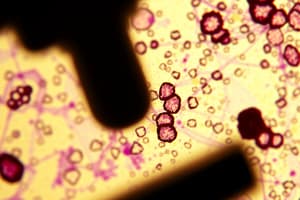Podcast
Questions and Answers
Suggest one possible cause of the anomalous result.
Suggest one possible cause of the anomalous result.
measurement error
What are two reasons how lungs are adapted for gas exchange?
What are two reasons how lungs are adapted for gas exchange?
large capillary network and good supply of blood
Name the process by which water molecules enter the root hair cell.
Name the process by which water molecules enter the root hair cell.
osmosis
Explain how plants absorb nitrate ions from soil.
Explain how plants absorb nitrate ions from soil.
Describe what happens during each stage of the cell cycle.
Describe what happens during each stage of the cell cycle.
Why does each different type of lipase act on only one specific type of lipid molecule?
Why does each different type of lipase act on only one specific type of lipid molecule?
Describe how the students would find out if the liquid from the leaf contained glucose.
Describe how the students would find out if the liquid from the leaf contained glucose.
Explain why the leaf in the light for four days contained both glucose and starch.
Explain why the leaf in the light for four days contained both glucose and starch.
Explain why the leaf left in a cupboard with no light for two days contained glucose but did not contain starch.
Explain why the leaf left in a cupboard with no light for two days contained glucose but did not contain starch.
How do thorns defend the gorse plant?
How do thorns defend the gorse plant?
A scientist noticed that in one area the gorse plants had yellow leaves and had stunted growth. Explain two other possible reasons for the yellow leaves and stunted growth.
A scientist noticed that in one area the gorse plants had yellow leaves and had stunted growth. Explain two other possible reasons for the yellow leaves and stunted growth.
Suggest how the nodules benefit the bacteria.
Suggest how the nodules benefit the bacteria.
Explain how the nodules benefit the gorse plant.
Explain how the nodules benefit the gorse plant.
Which plant material was chewed as a painkiller?
Which plant material was chewed as a painkiller?
Suggest two other factors which the scientists would have controlled in their analysis.
Suggest two other factors which the scientists would have controlled in their analysis.
Give two other conclusions about the relative risk of developing cirrhosis of the liver related to alcohol consumption.
Give two other conclusions about the relative risk of developing cirrhosis of the liver related to alcohol consumption.
Suggest two reasons why the data is considered to be valid.
Suggest two reasons why the data is considered to be valid.
Suggest one aspect of the survey which might reduce validity.
Suggest one aspect of the survey which might reduce validity.
Describe the effects of liver failure on the human body.
Describe the effects of liver failure on the human body.
Explain how increased phagocytosis of the Candida albicans pathogen will help the patient.
Explain how increased phagocytosis of the Candida albicans pathogen will help the patient.
Describe how the clinical trials should be carried out.
Describe how the clinical trials should be carried out.
Flashcards are hidden until you start studying
Study Notes
Causes and Errors
- Anomalous results can occur due to measurement errors.
Gas Exchange in Lungs
- Lungs have a large capillary network to maximize gas exchange.
- There is a good supply of blood to facilitate efficient transport of gases.
Water Uptake in Plants
- Water molecules enter root hair cells by osmosis.
Absorption of Nitrate Ions
- Nitrate ions are absorbed through active transport, requiring energy to move ions against a concentration gradient.
Cell Cycle Stages
- Stage 1: DNA replicates; subcellular structures increase.
- Stage 2: Chromosomes are separated to opposite sides.
- Stage 3: Cytoplasm and cell divide to produce two daughter cells.
Lipase Specificity
- Each type of lipase has a specific active site shape, allowing it to interact with only one lipid type.
Testing for Glucose
- To test leaf liquid for glucose, add Benedict's solution and heat. A color change from blue to yellow/green/orange/brown indicates glucose presence.
Photosynthesis Products
- Leaves exposed to light for four days contain both glucose and starch due to photosynthesis; excess glucose is converted to starch.
Dark Conditions Effect
- Leaves in darkness for two days have glucose but no starch as stored starch is converted back to glucose for respiration, with no new glucose production from photosynthesis.
Plant Defense Mechanisms
- Thorns on gorse plants deter herbivores and prevent damage from animals.
Causes of Plant Deficiencies
- Yellow leaves and stunted growth may result from:
- Lack of magnesium, leading to insufficient chlorophyll and reduced photosynthesis.
- Aphid infestation, which siphons sugars from phloem, limiting glucose for growth.
Bacterial Nodules
- Nodules provide bacteria with glucose from the plant for respiration.
- Gorse plants receive nitrate ions from nodules, essential for amino acid and protein synthesis.
Medicinal Plant Material
- Willow bark has been historically chewed as a painkiller.
Controlled Factors in Studies
- Controlled factors in health analyses include age, gender, diet, and fitness level.
Alcohol Consumption Risks
- Alcohol increases the relative risk of cirrhosis; small amounts can elevate risk even when not consumed with meals.
Validity of Data
- Data validity is supported by controlled conditions and a large sample size.
- Potential validity issues include respondents misreporting alcohol consumption.
Consequences of Liver Failure
- Liver failure leads to:
- No bile production, affecting fat emulsification.
- Altered pH in the small intestine.
- Inability to digest and absorb food, resulting in weight loss.
- Accumulation of lactic acid and toxins.
- Impaired blood glucose control, potentially causing diabetes.
Phagocytosis Benefits
- Increased phagocytosis of Candida albicans reduces cellular damage by engulfing more pathogens.
Clinical Trial Protocols
- Initial trials on healthy volunteers at low doses assess safety and side effects.
- Subsequent trials involve patients to determine the optimal dosage and efficacy over an extended period.
Studying That Suits You
Use AI to generate personalized quizzes and flashcards to suit your learning preferences.




